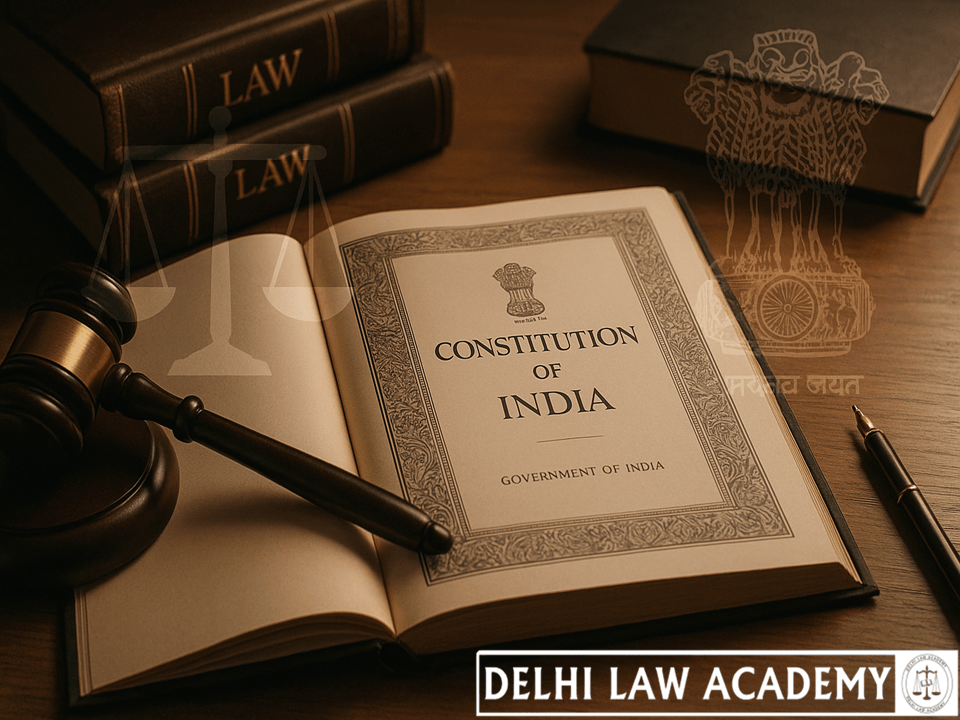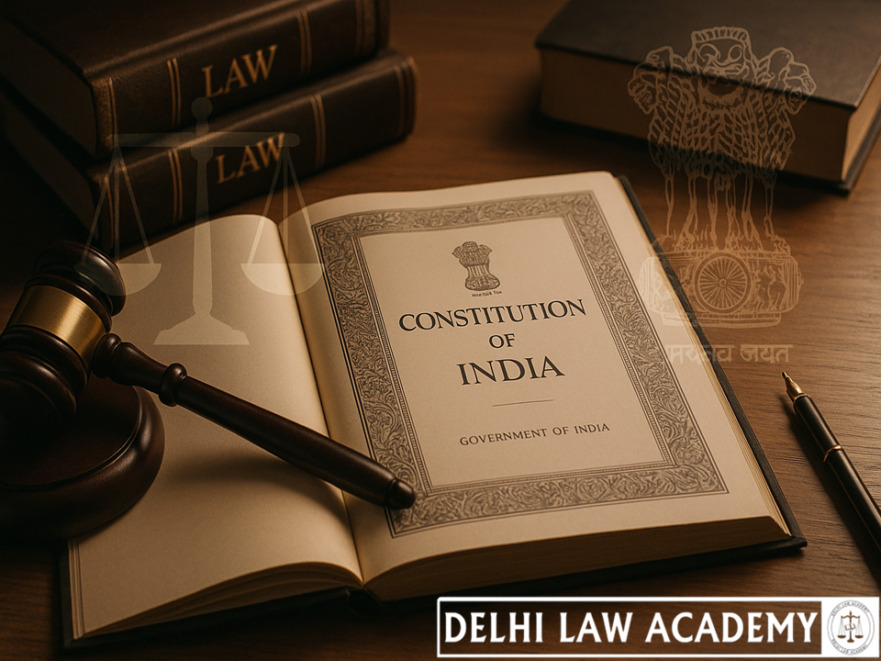
📘 Elections: Laws, Delimitation & Disputes (Articles 327–329)
Articles 327 – 329
TOPICS
- Election laws by Parliament
- Election laws by State Legislatures
- Bar against Courts
- ELECTION DISPUTES
- Representation of the People Act 1951
Supreme Court Judgments discussed in this post:
- Mohinder Singh Gill v. Chief Election Commissioner [1977]
Article 329(b) is a blanket ban on litigative challenge to electoral steps taken by the Election Commission for carrying forward the process of election to its culmination in the formal declaration of the result. - N.P. Ponnuswami v. Returning Officer [1952]
The right to vote is a legal right: The right to vote for election is not a civil right but is a creature of statute or special law.
Delhi Law Academy Jaipur presents below for aspirants of RJS, DJS, PCS (J) and other Judicial Services throughout India a simplified Note on the Constitutional provisions relating to Election laws, delimitation and election disputes.
⭐ Constitutional Provisions
Article 327 – Election laws by Parliament
- Parliament may by law make provision from time to time for elections to Parliament or State Legislatures including preparation of electoral rolls and delimitation of constituencies
- Election Laws made by Parliament:
- Representation of the People Act 1950
- Representation of the People Act 1951
Article 328 – Election laws by State Legislatures
- Subject to any law made by Parliament a State Legislature may by law make provision for elections to State Legislature including preparation of electoral rolls
Article 329 – Bar against Courts
- Validity of any law relating to delimitation of constituencies made under articles 327 or 328 shall not be called in question in any court
Additional related material supplied by DLA
- Delimitation means drawing of electoral boundaries
- Article 82 makes provision for delimitation of electoral boundaries after every census
- Delimitation Commission Acts: 1952, 1962, 1972, 2002
- Delimitation Commissions created in: 1952, 1963, 1973, 2002
⚖️ ELECTION DISPUTES
- No election to Parliament or State Legislature shall be called in question except by an election petition under a law made by appropriate legislature
Representation of the People Act 1951 – Key Provisions
- Section 80 – Election petitions: No election shall be called in question except by an election petition
- Section 80A – High Court to try election petitions
- Section 84 – Relief that may be claimed
📚 Case Law
Mohinder Singh Gill v. Chief Election Commissioner [1977 SC]
- Article 329(b) = blanket ban on litigation during the election process
- Only remedy is an election petition
- EC can order re-poll under Article 324
- Commission must act swiftly and independently
N.P. Ponnuswami v. Returning Officer [1952]
- Scheme: all matters vitiating elections must be raised only through election petition after results
- Article 329(b) bars all other challenges
- The right to vote is NOT a civil right; it is a statutory right.
📘 Stay Ahead with Delhi Law Academy!
Get access to free monthly current affairs, read our insightful blogs,
and explore free study resources prepared by experts at DLA Jaipur. 🚀
Frequently Asked Questions (FAQs)
❓ What is the scope of Article 324 regarding Election Commission powers?
🔽
🔽
Article 324 gives the Election Commission complete **superintendence, direction and control** over electoral rolls and the entire conduct of elections for **Parliament, State Legislatures, President and Vice-President**. It is the constitutional foundation for the EC’s independence.
🗳️ How does the Unified Electoral Roll under Article 325 work?
🔽
🔽
Article 325 mandates **one single electoral roll per constituency**, ensuring that nobody can be excluded or included **solely on religion, race, caste or sex**. It prohibits any “special electoral roll.”
👥 Who is eligible to vote under Article 326 (Adult Suffrage)?
🔽
🔽
Any **citizen of India aged 18 or above** who is **not otherwise disqualified** (unsound mind, non-residence, crime, corrupt practices etc.) is entitled to be registered as a voter.
📜 What are the key disqualifications for voter registration under the RP Act 1950?
🔽
🔽
A person is disqualified if he is **not an Indian citizen**, or is declared of **unsound mind by a court**, or is **disqualified under any election law**. These rules come from Sections 16, 19 and 20 of the RP Act 1950.
🚫 Can prisoners vote in elections under the Representation of the People Act 1951?
🔽
🔽
Section 62(5) bars **all persons in prison or police custody** from voting, except those under **preventive detention**. This applies even if the person’s name is on the electoral roll.
🧑⚖️ How secure is the tenure of the Chief Election Commissioner?
🔽
🔽
The CEC can be removed **only like a Supreme Court Judge**—through a special parliamentary procedure proving misbehaviour or incapacity. This ensures **independence** and shields the EC from executive pressure.
Contact us
📍 Delhi Law Academy – Jaipur Branch
6C, Tower 2, Coaching Hub, Pratap Nagar, Jaipur – 302033
📞 Phone:
+91 9911916552
+91 8447285606
✉️ Email:
contactus@delhilawacademy.com

